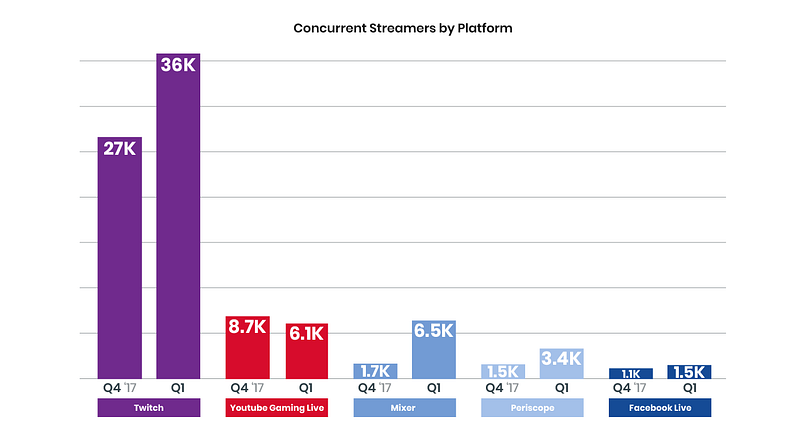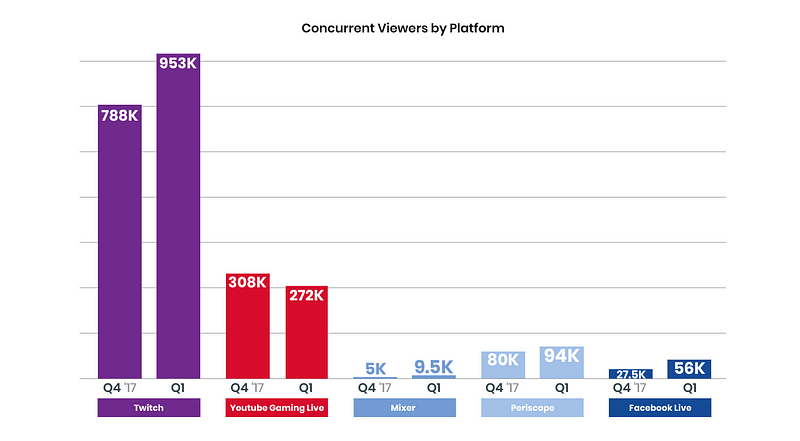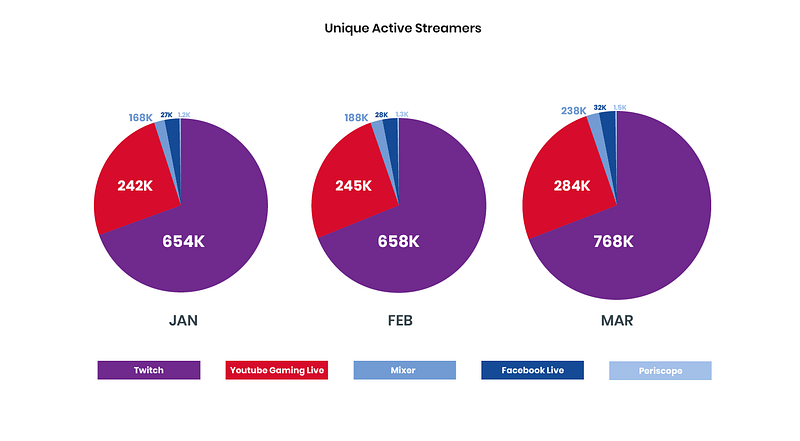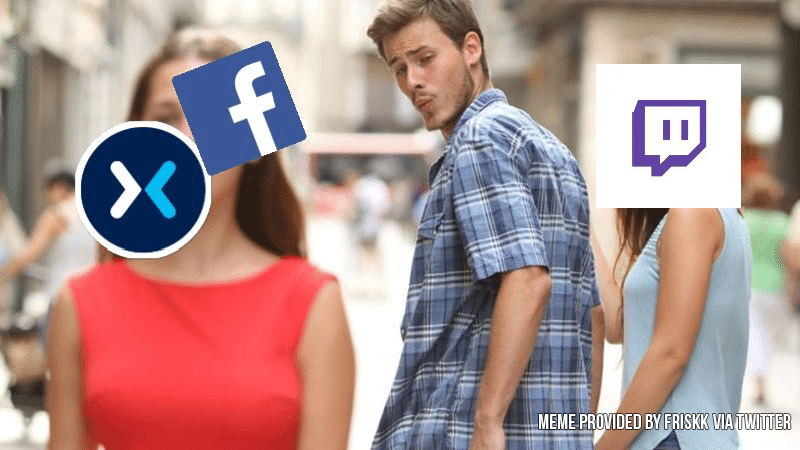“I will be leaving Twitch and moving to Mixer on June 18th”, Renée announced during her stream on May 30th.
This announcement stream instantly set off a wave of interest, questions, and even a few shocked “WHAT?” comments in her chat as she has been a veteran broadcaster and top representative over the past nine years on Twitch and is in the top 400 channels overall by follower count. She’s instantly recognizable from her DND campaigns or the long-running F’ed Up Friday shows. And although her average concurrent viewer count has dropped since 2015 from a peak of nearly 2,000 down to roughly 350 in recent days, she still holds a lot of clout among Twitch broadcasters.
I caught up with Renée to ask her to share more of her perspective on why she decided to leave Twitch, and she indicated that a primary motivator was the restrictive partnership contract she was under that’s she’s had since 2013:
“As a content creator, I disagree with the idea of being locked into one platform exclusively. Many years ago, Twitch was effectively the only option if you wanted to create live gaming content. But that has changed significantly.”, she said.
“Mixer, Facebook, and YouTube have all become viable platforms and they each offer creators something different, whether it be differing audiences, features, exposure, etc. I feel Twitch is holding back the very industry they helped create by holding their partners hostage to their platform.”, she continued.
“If Twitch opened their contracts to allow partners to stream on other platforms, the mid-size wouldn’t feel so frustrated because we would be free to create content & generate revenue elsewhere, including Twitch. But that’s the rub. Twitch is a business and opening their contract would be giving revenue to their competition. While it’s great for us as broadcasters and viewers to not feel pressured to subscribe or buy Bits, that’s a massive downside for Twitch.”
“In my opinion, if Twitch continues the way it is, we’re going to see a massive implosion similar to Machinima on YouTube. Creators aren’t necessarily going to leave Twitch because they’re unhappy with the platform, rather they’re going to go to other platforms because they can spread their content across MULTIPLE platforms.”
I reached out to Twitch to get more information about the exclusivity clauses in the Twitch Partner contract, but they responded that they “do not comment on business deals.”
However, the Affiliate version of the exclusivity contract is public, and a layperson-friendly summary of the 2.2 exclusivity clause in question is in their FAQs:
“The exclusivity clause does not … restrict Affiliates from using other streaming platforms to do live streaming. For instance, an Affiliate is permitted to start a stream on Twitch and, after ending that stream, immediately start a new, separate stream on another platform — assuming the Affiliate is not also using Twitch to broadcast that same content at the same time.”
Facebook Gaming is reported as having a similar “we own what you stream here and don’t multicast, but feel free to stream elsewhere afterward” partner policy as Twitch Affiliates have. However, Mixer seems to pride itself on not restricting partnered streamers from streaming to multiple platforms at once, so long as Mixer engagement is prioritized.
Twitch Partners had differing responses on social media about what is in their Partner contracts, often referring to being required to broadcast all applicable content on Twitch without being able to stream the same type of material on other platforms, even if it’s not the same content or at the same time.
Since the exact wording of these contracts is private, and there may be some variations among partner contracts, I won’t be able to share an example. And, despite asking multiple different lawyers who had reviewed partner contracts, my findings aren’t exactly comprehensive yet. I’m starting to believe people aren’t sure exactly what they signed. When I asked Twitch about this, they encouraged Partners to directly reach out via Partner Support with questions about contracts or cancellations.
So why Mixer? Or Facebook Gaming?
What are they offering that YouTube Gaming, HitBox, or any number of other previous competitive platforms haven’t attempted in the past? What is different this time to make it feel like a tipping point?
To answer this question, I put out a call for opinions and received way more than I bargained for with dozens of direct messages with people more than happy to tell me about why they switched, what was working for them, and offering advice to others who may be considering a similar move.
I felt, in a way, that I was conducting “exit interviews” from Twitch. Here are some highlights and consensus from how that went:
1) Twitch is over-saturated, and it’s hurting growth and discoverability for small and mid-size broadcasters
Over-saturation was, by far, the most common answer I heard. It wasn’t that Twitch had done something wrong, that there was anything Twitch could change, or that they were offered money to move. It was primarily that they felt they had reached a point where they could no longer grow on the platform.
“For me, the main motivation is feeling as though at some point I was going to hit a glass ceiling on Twitch. That at some point there wasn’t going to be any growth for me and that wasn’t acceptable for me,” said GeekChick who recently switched to Facebook Gaming after three and a half years on Twitch. “I think the mentality of Twitch has changed so much. When I first joined and was partnered in 2015, it was like… let’s all be friends and grow together and now its like… I will dropkick your entire family to get ahead.”
“Twitch is a saturated platform, and that makes growing much more difficult. I’m not exactly sure what Twitch could do to alleviate some of the small fish in a big ocean feeling, but that would have made me reconsider at least. Not everyone “makes” it in the streaming business, and that’s okay. I had a goal to be successful at content creation, and I made the decision that I felt was best for me to accomplish my personal goals.” said former Twitch Partner MaximusRaeke, a prior Twitch Partner who switched to Mixer about three and a half months ago after two years grinding on Twitch.
I mean there’s a lot of different reasons for different people. All I know on my end is it was a risk worth taking. Twitch is oversaturated. Growth has been stagnant for me in the 4yrs I’ve been on it. I’ve only been on FB for a few months and now have 300+ concurrents there.
— Jonna Mae 💋 (@themissesmae) May 31, 2018
“I think Twitch has to do more to feature casters who are growing and on the cusp. I understand it’s a business and they do what they can for their bigger names, but there are a lot of great casters who aren’t the top of the boards. Several of my favorites mainly play indie games. More needs to be done to help recognize others too, who are doing great things and with a bit more recognition, could do even better things.” –lilchief2007, a broadcaster who has been streaming on Twitch since 2014 but who was only able to attain affiliation.
“Twitch has felt over-saturated for some time and over the course of the last year the atmosphere has changed drastically in my opinion. I think it’s time for me to make a change and be involved with a platform earlier in its development so that I can grow with it. Switching now is a combination of what’s sensible business-wise and improves my quality of life.” – JustMeCasey, a current Twitch partner who has entered conversations to move to Mixer.
Just to clear any confusion,
I fucking love @Twitch.
-Gave me an incredible career
-Introduced me to the love of my life
-Made some of my best friends I’ve ever had
-Opened doors to incredible opportunitiesI’m leaving to expand my brand and better my career. Not out of anger.
— Derek Mallon – punjistick (@punjistick) May 31, 2018
2) Mixer feels like Twitch felt like several years ago
Users I queried often talked about how much of a tight-knit family community that Mixer currently has. And how supporting and non-competitive people seem in comparison to the current Twitch environment. And how hyper-attentive the Mixer Partner support staff are in contrast to how thinly support staff at Twitch are spread with supporting nearly 30,000 partners. (It’s commonly rumored that new Twitch partners are not given a Partner Rep, and are instead being asked to use a priority queue on the Support site instead.)
“Remember when Twitch was Twitch before Amazon bought them? That is Mixer currently; the community growth and love of streaming. That is what Mixer is all about.” – StephenSmitley
“Yes. I’m putting Mixer on a pedestal because of how small it is right now and I love that. I like the idea of being a close-knit family between the broadcasters and viewers who have across the board kindness towards everyone. There’s always a bad egg, but my tweet about moving to Mixer and the greetings made my day. That’s amazing to me and I’m more excited now.” – a former Twitch partner who asked not to be named.
“I’ve done a few streams on Mixer and for a new person on there, and a growing community, I found relative success on there for someone “new” and seeing many people I look up to move there, with there base and community, makes me believe I too, can start something good there, and positive words from people who are on there saying I too, can do great things if I tried.” – lilchief2007
“I value Mixer’s ability to staff live support resources for its streamers, over receiving an automated e-mail after three weeks when filing a claim on Twitch, only to never be heard from again afterward.” – its_henley
3) Smaller platforms allow you to grow along with the platform
Users frequently mentioned the idea that Facebook Gaming or Mixer offered a “ground-floor” which would give them a greater voice with the leadership, as compared to Twitch, and would allow them to grow with the platform in future years in a way that they perhaps missed out on with Twitch.
This isn’t a movement, or a statement to make people think Twitch did something wrong to me or make me personally WANT to leave.
I believe in @WatchMixer and want to work with them from the ground up and be a part of it in a way I was just too late to the game to do with Twitch.
— Derek Mallon – punjistick (@punjistick) May 31, 2018
4) Retention is an issue, but not necessarily growth
I repeatedly heard that retention of the audience was about 25% for a transition from Twitch to Mixer from those who had switched several months ago or more, which matches what I’ve heard Mixer advises switchers as well.
“As for my bottom line, my streaming is at an all-time high. I have a very strong growth rate and feel even looking at numbers that things are going in the right direction. For the first time in five years of streaming, I actually have a strong supplemental income and as this is becoming a real thing, I have the full support of my family. When I left Twitch I’d say about 25% of my subscribers came over, 25% of them were mad at me, and 50% just fell off” – DZ, who started streaming on Twitch in 2014, got partnered in 2015 and made the move over to Mixer in February 2017.
StephenSmitley, who streamed on Twitch for over three years, revealed that he retained almost exactly 25% of his prior audience when switching to Mixer to join his friend DZ.
“I have about 30% more subs now than I did on Twitch when I left and with the free subs that Mixer recently gave away, I expect on that number jumping greatly in the short term. Biggest loss has been in the form of tips as much of my tip income came in the form of bits. So there was a decent drop off there but nothing that has hit me hard. Most of my daily viewers came over.” – Angry_iceberg
5) Fewer people were paid to switch over than what people are assuming. Money was never described as a determining factor
I can’t give you exact details since partnered broadcasters are forbidden from disclosing information about paid contracts. I’ll give you some rumors and rough estimates, however.
“Any content creator worth a damn was never in it for the money. We’re in it because we love it, and having a stable income is just a bonus.”
How much is it worth to a platform to bring over a prominent Twitch partner?
It’s no secret that Facebook is paying influencers to use their live streaming platform. The Wall Street Journal reported in 2016 on a deal that leaked which showed Facebook would pay 24 influencers a total of 2.2 million dollars.
Also in 2016, Facebook signed deals with 140 media companies and celebrities worth $50 million if they’d host regular broadcasts.
And with the Blizzard Facebook integration, it’s clear that they’re targeting what Twitch has and have deep pockets to help win people over.
At PAX East, I heard rumors that Facebook staff were targeting Twitch broadcasters with as few as ten thousand followers with long-term deals worth as much as $5,000-15,000 per month. Some said Facebook touted upcoming benefits, such as healthcare(!). Other partnered broadcasters are reporting that they’ve received emails in the last few months with similar offers.
Mixer appears to be a bit more selective on who they offer paid contracts. Very few of the people who’ve moved to Mixer have been paid to do so. And not the ones that people are assuming, perhaps. Seems to be more gaming-focused, compared to Facebook offering a more general platform. The way their contracts are structured seems to be more individualized as well, with the baseline contract amount meant to match your prior Twitch income for awhile to help you get on your feet in the early months of broadcasting there.
(I should note that I was not given these estimates by the people mentioned in this article nor by the staff of any of the platforms and I’m unable to confirm specifics or guarantee any level of accuracy. Should be regarded as rumors, not facts.)
6) Twitch’s lack of consistent moderation or no longer listening to the overall community
“I can understand why Twitch wants to monetize everything, but sometimes I feel like they’re for themselves and not for us. Like we’re just numbers now. They’re implementing functions without addressing it with the community to learn whether it’ll work or not. They’ve proven to me that there’s a huge disconnect that wasn’t there when I started.” – Anonymous former Twitch partner
“It’s been growing increasingly difficult to be a female streamer on Twitch. [The last straw] with Twitch is the lack of TOS enforcement across the board. I was thrilled when they updated and revised their TOS – I really had high hopes for the platform to reform itself, but in reality, it only made it worse. The lack of enforcement across all streamers big and small created resentment, witch-hunting, rioting, and opened the gateway for even more trolling. While trolls know they’re less apt to be able to get away with their behavior in chat, they’ve taken towards the route of mass reporting and other means of harassment. It’s been months now of this happening to many streamers. It seems as though no one has received a direct response from Twitch themselves regarding how to help protect their streamers against this behavior.” – Its_henley
Other users gave me stories about being passed over for promotion by the platform, never able to break into “the ol’-boys-club” that they were sure existed, or accusing Twitch as being a “haven of IRL ASMR fetishists.” But, these complaints were in the minority overall.
Advice to those considering a switch from those who already have
I asked those who had decided to make a switch to give a final closing piece of advice to others who were considering a move. From the dozens of responses, a couple of highlights:
“If you’re making a full-time income on Twitch right now, stay on Twitch. Even if you’re a big streamer on Mixer, you’re probably not going to be making as much as you were making on Twitch at first unless you were paid to move. The lack of Bits is a substantial hit to income. Switching platforms isn’t for everyone. If you want to be in at the ground floor of something because it matches where you want yourself to be in the future, now is a good time to switch, but make sure you stick with it and give it your best shot.” – GeekDomo
“For those interested in switching to a different platform, it’s important for them to understand what sort of creator they are. Will their content fit on other platforms or do they truly #BleedPurple? Does it financially make sense? Will their communities follow them or are they comfortable starting from ground zero? In a perfect world, we’d be able to stream on all the platforms because we’re entertainers. We want to entertain as many people as possible. The loyalty I have isn’t to the platform I’m on, rather to the community I’ve created.” – Renée
How does the process of making the jump work?
Some partners who left Twitch just left the Partnership agreements open and just started experimenting or even completed a full switch to other platforms. I would not advise doing that. Partners who assume they’ll still get the perks like Partner party access, swag, meet and greet consideration, free TwitchCon tickets and other such perks will likely be up for a surprise at a later date when those perks are revoked.
Before accepting another Partnership offer or switching platforms, reach out to Twitch to find out how much time remains on your contract and what the process would be for you to depart.
In most cases, Partners who did that were able to amicably discuss it with their Partner rep and come to a mutually agreed-upon date in the future where both sides agree to drop the Partnership, freeing broadcasters to pursue other platforms and accept other partnerships.
However, I have heard of a couple of cases where the Twitch Partnership rep was not willing to let the Partner go before the end of the auto-renewing annual contract and threated escalation if they attempted to leave early, forcing some months of extra time on the platform. It’s unclear if that is a rare exception or if there are some additional complications when trying to cancel for some Partners. The public is not made privy to those kinds of negotiations. Your mileage may vary.
In any case, Twitch recommends dealing with the Partnership team directly for these kinds of concerns. And it’s just professional courtesy to leave bridges unburned and not be found in breach of a contract and amicably dissolve an exclusive business relationship before moving on.
FTC Concerns about disclosure
There was some debate if disclosure was necessary for making a switch to a different platform if that switch was paid. I asked the FTC directly about this, giving them an example of the real-world scenario in question. Here is my original question:
“Streamer (we’ll call them JoeBlow) is a partner on Twitch, an independent contractor who gets revenue from ads, subs, tips.
JoeBlow gets an email from Facebook Gaming offering him a guaranteed $5k a month for a year on top of the normal ad/sub/tip revenue he’d normally get if he’ll stream on a new platform.
JoeBlow accepts and starts to stream on a new platform, collecting now both a check from the platform in addition to the ad/sub/tip revenue he’d normally get.
In that scenario, would JoeBlow be required to disclose that he had been paid to move to a new location?
If the answer is yes, what would the best way be to disclose it? Would he disclose it for the length that he was being paid or just when he announced the move?”
And here is their response:
“Thank you for writing to the FTC.
You ask about a streamer who is paid to switch the platform he or she uses to stream. I would view the scenario you describe as analogous to a talk show host switching her show from ABC to CBS because she is getting a better deal at the other network. I don’t believe a disclosure is necessary.
Please also note that these are my informal views and are not binding on the Commission.
Very truly yours,
Michael Ostheimer”
So there you have it. Disclosure may not be required from a governmental perspective, but keeping your audience informed as best you can without breaking NDAs or contractual agreements will still be thought of as more transparent.
Final thoughts and conclusion
A massive wave of hype and FOMO (Fear of Missing Out) swept social media on Wednesday and Thursday of this past week as these announcements rolled out and as hundreds of broadcasters openly confessed their thoughts, fears, and hopes for the diversification of platforms that is happening.
“Have I peaked on Twitch? Does some other platform handle TOS better? Could I be paid a guaranteed salary to switch? Is it better to be a big fish in a small pond or a small fish in a big pond? Will Twitch do anything to help me get discovered or should I try my chances somewhere else?”
Some were stating their intentions of staying on Twitch, regardless of what happens elsewhere.
Some free advice from the editor:
First of all, let me apologize for the one-sidedness of this article. I only sought opinions for those switching FROM Twitch, not those who have decided to stay or move TO Twitch from other sites (notably, YouTube). I will try to address more perspectives with follow-up articles at a later time since this is running quite long.
1) You’ve heard the saying: The grass is always greener on the other side of the fence.
I’ll go a step further than that… “The grass is a whole lot easier to keep clean when it’s considerably smaller.”
Mixer and Facebook are perhaps only appealing right now to people because they’re smaller than Twitch. Much smaller. Here is a couple of recent graphs from StreamLabs which demonstrate how far everyone else has to catch up:



And the crazy thing is, Twitch isn’t done growing. They rose 21% in concurrent viewers between Q4 2017 and Q1 2018, according to StreamLabs. Facebook and Mixer’s growth percentages are higher, but they have so far to catch up, especially if Twitch continues to grow. The loser right now appears to be YouTube Gaming who is the only one shrinking (possibly due to the Adpocalypse demonetization issues they’ve been going through in recent months).
But with those saying how much more attentive Mixer is than Twitch, here’s some food for thought… Mixer has an estimated 500 Partners or fewer. Meanwhile, Twitch has close to 30,000 Partners and well over 150,000 Affiliates. It’s a lot easier to be attentive and welcoming if you have a better staff-to-influencer ratio and that should weigh into your judgment.
2) Twitch may be cluttered, but still has the most feature-complete platform
Yes, the rate of innovation is higher on other sites, but they’ve got a lot further to go.
The number of monetization options is unparalleled by the other platforms. Mixer still lacks a form of Bits, but Facebook has “Stars” which pay out roughly the same as Bits do. Mixer only has one tier ($5.99) of subs. Facebook doesn’t have subs at all. Mixer allows revenue splitting of game purchases like Twitch does, but Facebook does not. And let’s not forget Twitch Prime, which has often doubled the average sub counts broadcasters would have otherwise.
All the platforms have a type of VOD system, but only Twitch has Clips and Highlights.
Facebook’s Pros/Cons:
Pros: Their killer advantage is access to a sizable demographic which isn’t usually the type to watch gaming streams. And users stay on the site for a very long time.
Cons: There is some concern that viewer count numbers are inflated due to viewers being counted as they scroll past streams in their feed. There are also concerns about viewers typically using real-name identities by default (although you can create a fan page and chat as that page to help hide your identity, with some extra steps). And the recent examples of massive privacy concerns and private data being sold are still present in a lot of people’s minds about Facebook. Facebook limits you to 4 hours in a single broadcast. A 24-hour stream would be you starting and stopping the show at least six times.
Mixer’s Pros/Cons:
Pros: Their killer advantage is the native support of Windows 10 and Xbox. And access to the wealth of resources that Microsoft would offer, who has experience in supporting the Xbox Live environment for a very long time. The sub-second FTL protocol was previously touted as a killer advantage, but with Twitch now reducing to the 2-second range, the difference isn’t as pronounced. The built-in multistream is also a unique feature.
Cons: Some are concerned that it’s a very Xbox-heavy environment. Yes, there is a considerable PC representation with native Windows 10 streaming, but there isn’t a native PS4 app for Mixer (it sounds like Mixer is open to it, but Playstation isn’t a fan of working with the competition). Some broadcasters resent needing to have Microsoft accounts or be working with Microsoft, especially since Windows 10 is still held in disdain by some broadcasters.
3) People are quick to criticize Amazon’s control of Twitch, but step back and look at who the competition is. Remove your platform bias for just a second.
The Big Four largest tech companies are battling it out in a proxy war in yet another arena. Live Broadcasts are not the first time Microsoft, Amazon, Google, and Facebook have competed in a category.
So fast-forward a couple of years. Let’s say Mixer succeeds in capturing the same type of numbers that Twitch has right now. Do you think that Microsoft won’t begin to interfere with Mixer’s mission in the same way that it’s accused Amazon is with Twitch? After all, it took a couple of years after the Amazon purchase of Twitch for anyone to start noticing changes in the priorities of the company. Mixer has just barely hit the one-year mark post-acquisition now.
Twitch, in many ways, fathered a generation of video game broadcasters. Twitch is still the force to be reckoned with, basically pioneering an entirely new breed of online influencers. But with money to be made and an increased acceptance of the influencer culture, it only makes sense that competitors will come and go as they gun for what Twitch has built. It’s too early to say if Twitch will decline as Mixer and Facebook Gaming grow. But we’re reaching a point where you could make a career on more than one such platform. And many will try.
When I asked Twitch about their competition, they didn’t seem to be very bothered by it. “Twitch is community, not competitor focused, so we listen to our users in order to build the tools, features, and programs they need to be successful. This spans a number of areas, such as monetization, moderation, infrastructure, interactive technology, and inclusivity, to name a few.”
Oh, by the way, I didn’t even have time to talk about this, but did you know Patreon has a livestreaming platform now? And is rumored to be paying out significantly more per supporter than any of the other platforms? They seem to be catching many of those affected by YouTube loss of revenue especially. And what about Caffeine, which is an up-and-coming streamlined broadcasting platform that was co-founded by the former Product Design Lead and Senior User Experience Designer from Apple.
This next year will be intensely interesting.






Having a hobby and being passionate about something is fantastic. Earning a living from your passionate hobby is extremely difficult. How many artists / actors / sportsman / musicians / writers / photographers / chefs are out there struggling everyday, living paycheck to paycheck, while patiently hoping that they one day will be able to make money off their passions?
You might have to stay a small streamer for years before you grow, just look at Ninja. He streamed for several years, playing a variety of games to a little community, even playing Fortnite for several months at relatively low numbers then just suddenly exploded and became the largest thing on Twitch.
Other examples would be if you can provide a unique voice with quality content, then it’s possible to break though and get noticed immediately. Two streamers that come to mind would be DrDisrespect and Sheriff Eli. Both of them have pretty similar histories as they started streaming and in a very short period of time, got noticed and grew to be larger well-known figures based solely on their fresh take of presenting themselves and their content to viewers.
Those are only three examples of many that during this recent time of “oversaturation” on Twitch who were still able to find a community and make a big imprint for themselves despite all the competition. It goes to show that providing quality content or competitive level gameplay are more than likely going to be the biggest factors into getting yourself noticed amongst the crowd.
Platforms could put every resource that they have into backing you and mentioning you as often as possible on social media; but if you’re lacking in entertainment value (i.e. boring, barely interact with your community, lazy and undedicated) or a completely unskilled gamer (i.e. one of the first 5 dead players every match during a BR game) than it’s highly unlikely that people are going to want to watch you at all, let alone subscribe to your content or tip you for what you’re providing.
Not everyone will be able to make a living being a streamer. Sometimes even when doing everything right, pouring your heart into a passion, the stars just never align and you’ll end up having to find another way to support yourself. Absolutely take a chance on your dream, switch to that new platform, see if a better opportunity arises, go for it and try your best… just have the common sense to realize that you might have to give up on that dream. You don’t want to be just like the local band, with members all in their 50’s, still playing at bars thinking that the next gig will be their big break.
If you can’t make a name for yourself and grow your community on Twitch, then again can’t on Mixer, then again can’t on YouTube Gaming, then again can’t on Facebook… well at some point in time you might want to take a look inward and stop thinking that “Platform Oversaturation” is the only reason for your lack of growth.
No matter how much impact you feel your content should make on people’s lives, or how big you feel you should be, it just may never connect with a larger audience, which is absolutely fine. Have fun with what you can, enjoy the community you build and cherish the few lives that you are able to touch in a positive way. If you focus on those few things more than “growth”, guaranteed you’ll have a much better experience overall even if your dream never ends up being able to fully support you.
Interesting that people would rather blame the platform, and jump ship completely without even TRYING the other platform first, assuming that because it looks like a newer platform it grants you somehow more “potential”.
Entertainers, content creators, journalists, writers…these are SKILLED trades still, not just for anyone.
Finding a new platform guarantees nothing for you, but brings you unfounded hope that you have some “better” chance at being more entertaining, or that more people will be there.
This is just false, as I understand it.
That doesn’t mean you shouldn’t try, but I think it’s safe to assume that those who haven’t seen growth may benefit more from learning more about their trade, than changing their platform.
Just be realistic with your own situation, and take advise from those you can. Grow as a creator before you worry about community.
Love the industry and hope it doesn’t destroy itself.
Best of luck to all creators!
While Twitch might be growing still it’s important to also realize that it’s growing for the larger streamers and not so much for the new, small and even mid-size streamers.
The way Twitch has their site set up the large streamers are always at the top and any new viewers who are coming in to check out games and such will naturally gravitate towards the channels at the top rather than scroll down the list to find smaller streamers.
Additionally there are also so many small streamers that the few viewers that do go down the list to find “less spammy” chat rooms for the games they want to watch will be thinned out among that wide selection of small streamers.
I personally prefer small and mid-sized streamers over the large ones, but I know I am in a minority when it comes to that thinking. Reason for me to even watch streams is because I also want to engage with the streamer, e.g. by asking them questions about a game, what they feel about it, get some tips and tricks as well as help out the streamer if they need some pointers.
The interaction is the appeal for me when it comes to streaming. That’s why I watch streams and that’s why I do a little bit of hobby-streaming myself. If I just wanted “monologue”-entertainment I’d be watching Netflix and such.
Going over to a new platform means better chance for small streamers to attract viewers since it won’t be as saturated as Twitch. And now with the different software being compatible with multiple platforms (e.g. the Elgato streamdeck products, StreamLabs OBS and so forth) it makes it easier to hook up and switch between platforms too.
At the end of the day both Twitch and gaming in general was always about fun, hanging out and socializing, but I honestly feel that in the later years it has been taking a slow turn towards something different. It’s more cutthroat, feisty, competitive and become very focused around the money. This gets evident when even small streamers have Paypal donation buttons, Patreon accounts, large banners with money goals of like 500$ for this months rent or some such. Personally I think it’s a combination of different sites (Patreon, Paypal, Gamewisp and others) as well as Twitch itself facilitating and setting people up to focus on making money.
I understand that some streamers want to make a living out of streaming, but is that the only thing that streaming has boiled down to become? A cash income? Is it not about community, interaction, enjoying games anymore?
Maybe that is also why other platforms are more appealing. The focus and push to becoming a cash-cow and then locking you into a one-platform-only contract isn’t the same as on Twitch.